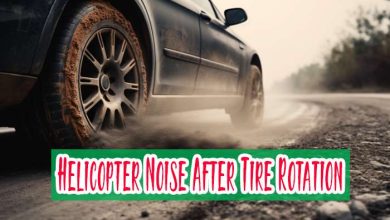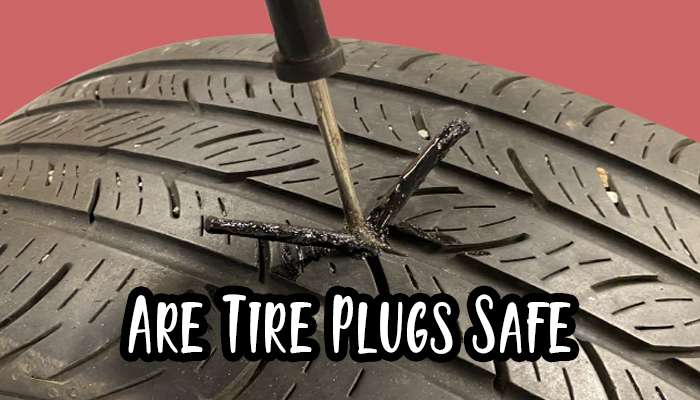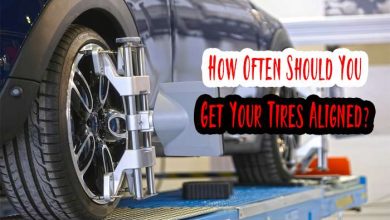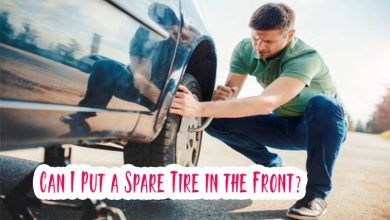Why Does My Same Tire Keeps Blowing Out?
As a tire expert, I’ve seen everything regarding tires and rims. One common issue that frustrates drivers is when the tire keeps blowing out. If you’ve ever experienced this problem, you’re not alone.
In this blog post, I will delve into the basics of tire blowouts, why the exact tire keeps blowing out, and how you can solve this recurring issue. So, fasten your seatbelts as we explore the world of tires and rims.
Read my recent post- Do You Need to Balance Tires After Rotation?
Basics of Tire Blowouts
Tire blowouts are more than just inconveniences; they can be dangerous, causing loss of control, accidents, and costly repairs. Understanding the fundamentals is crucial for preventing blowouts.
What Is a Tire Blowout?
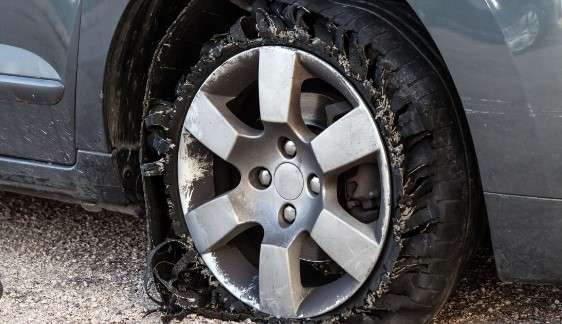
A tire blowout occurs when a tire suddenly loses air pressure, often accompanied by a loud bang. This leads to the tire’s rapid deflation, making your vehicle unstable and challenging to control.
The Anatomy of a Tire
Tires have several components, including the tread, sidewall, and inner liner. The tread provides traction, while the sidewall supports the vehicle’s weight. Inside, you have the inner liner, which holds the air. When any of these components fail, a blowout can happen.
Causes of Tire Blowouts
Various factors can trigger blowouts:
- Underinflation: The most common cause of blowouts. When a tire is underinflated, it generates excessive heat during driving, leading to tire failure.
- Overloading: Exceeding your tire’s load capacity places immense stress on the tire, increasing the risk of a blowout.
- Potholes and Road Hazards: Striking potholes or road debris can damage your tire, weakening it and making it prone to blowouts.
- Aging Tires: Over time, tires degrade, and the rubber becomes less flexible, increasing the likelihood of blowouts.
Now, let’s delve into the crux of the matter.
Why The Same Tire Keeps Blowing Out?
This is the mystery that many drivers face. Why does it seem like the exact tire keeps blowing out repeatedly? Let’s investigate this persistent issue.
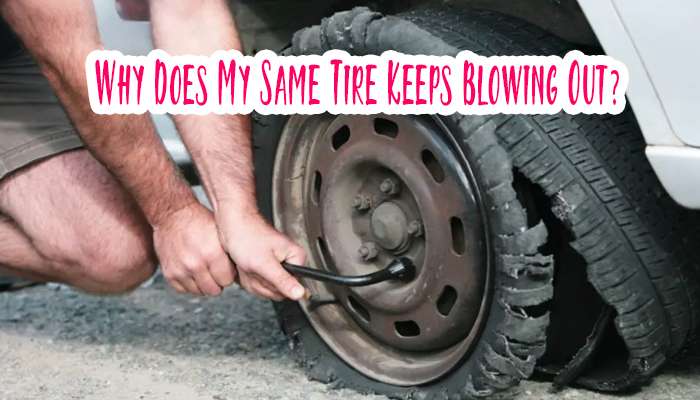
1. Uneven Wear and Tear
An uneven wear and tear is one common reason for a recurring blowout on the exact tire. If your vehicle has alignment issues, it can cause uneven tire pressure distribution. One tire takes on more weight and stress, making it prone to blowouts. Regular tire rotations and alignments can help mitigate this problem.
Read Also: Does America’s Tire Do Alignments?
2. Quality and Age of Tires
The quality of your tires matters. Cheaper, low-quality tires are more susceptible to blowouts. Similarly, if all your tires are old and worn, they’re more likely to fail, but you might notice it happening more frequently on one tire because it reached the end of its lifespan first.
3. Road Conditions
The roads you travel on play a significant role. If your daily commute includes rough terrain, gravel roads, or other challenging conditions, it can wear out your tires unevenly and lead to blowouts on the same tire.
4. Driving Habits
Aggressive driving, such as sudden stops, sharp turns, and excessive speeding, can wear out a tire faster than normal. If you tend to drive aggressively, it can explain why the same tire keeps blowing out.
5. Rims and Wheels
Issues with the rims or wheels can also lead to recurring blowouts on the same tire. A bent rim or damaged wheel can create uneven pressure on the tire, causing it to fail.
Read Also: Tire Went Flat Overnight But Now Holds Air
How do you solve the same tire that keeps blowing out?
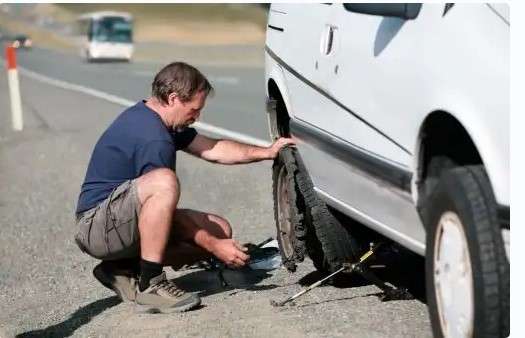
Now that we’ve explored the reasons behind the recurring blowouts let’s discuss some solutions to this frustrating problem.
1. Regular Maintenance
The key to preventing recurring blowouts is regular maintenance. This includes:
- Tire Rotations: Ensure your tires wear evenly by rotating them regularly, typically every 6,000 to 8,000 miles.
- Alignment: Keep your vehicle properly aligned to avoid uneven tire pressure.
- Quality Tires: Invest in high-quality tires. They may cost more upfront, but they’ll save you money in the long run by lasting longer and being more resistant to blowouts.
- Check Your Driving Habits: If you tend to drive aggressively, consider adjusting your habits to reduce tire wear.
2. Inspect Your Tires
Frequently check your tires for signs of wear, damage, or punctures. If you notice any issues, address them promptly. This can help you prevent blowouts before they happen.
3. Avoid Overloading
Never exceed your tire’s load capacity. Make sure your vehicle and its cargo are within the recommended weight limits.
4. Drive Carefully
Lastly, drive carefully and avoid harsh road conditions whenever possible. Being mindful of your driving habits and the environment you’re driving in can go a long way in preventing blowouts.
Frequently Asked Questions
Can the same tire blow out multiple times due to bad luck?
While it may feel like bad luck, recurring blowouts are often due to specific issues such as alignment problems, tire quality, and road conditions. Addressing these factors can break the cycle of repeated blowouts.
How often should I get my tires aligned?
Regular tire alignments are recommended every 6,000 to 8,000 miles or as specified in your vehicle’s manual. This helps maintain even tire wear and prevents blowouts.
Is it necessary to replace all tires if one keeps blowing out?
Not necessarily. If one tire keeps blowing out due to a specific issue like damage or poor quality, you can replace that tire alone. However, it’s a good idea to inspect and possibly replace all your tires if they show signs of wear and tear.
Why would a brand-new tire pop?
New tires can pop due to manufacturing defects, underinflation, or damage from road hazards. If your new tire blows out, contact the manufacturer or the retailer for warranty coverage.
Can low tire pressure cause a blowout?
Yes, low tire pressure is a common cause of blowouts. Underinflated tires generate excessive heat during driving, weakening the tire and increasing the risk of a blowout.
Conclusion
Understanding why the exact tire keeps blowing out is the first step in preventing this frustrating problem. Uneven wear and tear, tire quality, road conditions, and driving habits all play a role.
By following proper maintenance and being vigilant about the condition of your tires, you can ensure a safer and smoother journey on the road.
Glossary
- Alignment: Adjusting a vehicle’s suspension to ensure that the wheels are aligned with each other and the road for optimal tire wear and handling.
- Tire Pressure: The amount of air pressure inside a tire, which affects its performance, safety, and longevity.
- Suspension System: The collection of parts that connect a vehicle’s wheels to its chassis, supporting the vehicle’s weight and providing a smooth ride.
- Tread: The patterned surface on a tire that makes contact with the road, providing traction and control.
